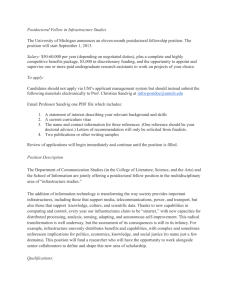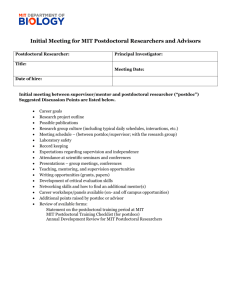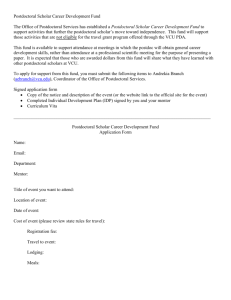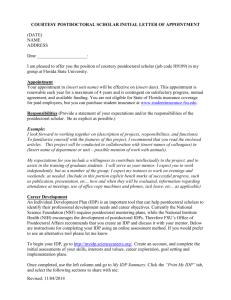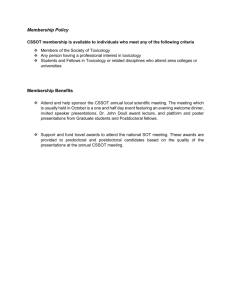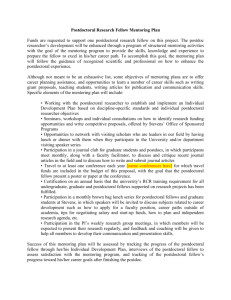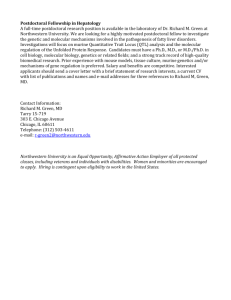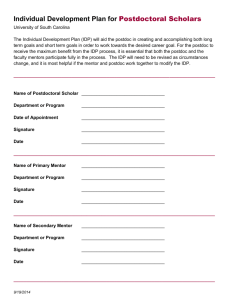Postdoc Individual Development Plan (IDP) Guidelines
advertisement
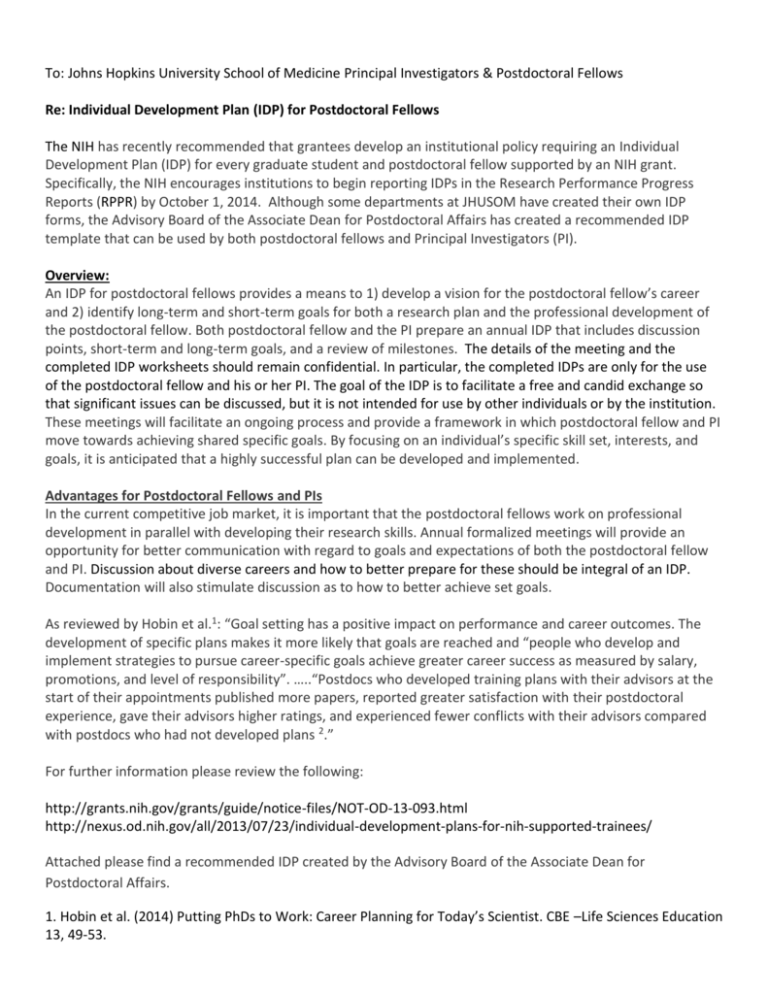
To: Johns Hopkins University School of Medicine Principal Investigators & Postdoctoral Fellows Re: Individual Development Plan (IDP) for Postdoctoral Fellows The NIH has recently recommended that grantees develop an institutional policy requiring an Individual Development Plan (IDP) for every graduate student and postdoctoral fellow supported by an NIH grant. Specifically, the NIH encourages institutions to begin reporting IDPs in the Research Performance Progress Reports (RPPR) by October 1, 2014. Although some departments at JHUSOM have created their own IDP forms, the Advisory Board of the Associate Dean for Postdoctoral Affairs has created a recommended IDP template that can be used by both postdoctoral fellows and Principal Investigators (PI). Overview: An IDP for postdoctoral fellows provides a means to 1) develop a vision for the postdoctoral fellow’s career and 2) identify long-term and short-term goals for both a research plan and the professional development of the postdoctoral fellow. Both postdoctoral fellow and the PI prepare an annual IDP that includes discussion points, short-term and long-term goals, and a review of milestones. The details of the meeting and the completed IDP worksheets should remain confidential. In particular, the completed IDPs are only for the use of the postdoctoral fellow and his or her PI. The goal of the IDP is to facilitate a free and candid exchange so that significant issues can be discussed, but it is not intended for use by other individuals or by the institution. These meetings will facilitate an ongoing process and provide a framework in which postdoctoral fellow and PI move towards achieving shared specific goals. By focusing on an individual’s specific skill set, interests, and goals, it is anticipated that a highly successful plan can be developed and implemented. Advantages for Postdoctoral Fellows and PIs In the current competitive job market, it is important that the postdoctoral fellows work on professional development in parallel with developing their research skills. Annual formalized meetings will provide an opportunity for better communication with regard to goals and expectations of both the postdoctoral fellow and PI. Discussion about diverse careers and how to better prepare for these should be integral of an IDP. Documentation will also stimulate discussion as to how to better achieve set goals. As reviewed by Hobin et al.1: “Goal setting has a positive impact on performance and career outcomes. The development of specific plans makes it more likely that goals are reached and “people who develop and implement strategies to pursue career-specific goals achieve greater career success as measured by salary, promotions, and level of responsibility”. …..“Postdocs who developed training plans with their advisors at the start of their appointments published more papers, reported greater satisfaction with their postdoctoral experience, gave their advisors higher ratings, and experienced fewer conflicts with their advisors compared with postdocs who had not developed plans 2.” For further information please review the following: http://grants.nih.gov/grants/guide/notice-files/NOT-OD-13-093.html http://nexus.od.nih.gov/all/2013/07/23/individual-development-plans-for-nih-supported-trainees/ Attached please find a recommended IDP created by the Advisory Board of the Associate Dean for Postdoctoral Affairs. 1. Hobin et al. (2014) Putting PhDs to Work: Career Planning for Today’s Scientist. CBE –Life Sciences Education 13, 49-53. 2. Davis G (2006) Improving the postdoctoral experience: an empirical approach. In: The Science and Engineering Workforce in the United States, ed. R Freeman and D Groff, Chicago: University of Chicago Press. Martha Zeiger MD, Associate Dean for Postdoctoral Affairs and the Postdoctoral Advisory Board Individual Development Plan for Postdoctoral Fellows Johns Hopkins University School of Medicine An Individual Development Plan is an integral part of mentoring. However, the mentoring process should be ongoing, active and driven by the mentee. In preparation for the meeting to discuss the Individual Development Plan (IDP), both postdoctoral fellow and PI both should fill out the form. The outcome of the meeting should be a series of agreed upon action items with a reasonable timeline for implementation and summarized on the form. Both mentor and mentee should keep documentation of the meeting. The details of the meeting and the completed IDP worksheets should remain confidential. In particular, the completed IDPs are only for the use of the postdoctoral fellow and his or her PI. The goal of the IDP is to facilitate a free and candid exchange so that significant issues can be discussed, but it is not intended for use by other individuals or by the institution. The meeting should occur annually, and if agreed upon, more frequently. The following is a suggested list of topics, created primarily to help facilitate the mentoring process: Summary of what to prepare for the meeting 1. CV Postdoctoral CV format: https://drive.google.com/file/d/0B_wrvHF2rx6Na0NET2NIcjB4elU/edit?usp=sharing 2. A mission statement describing the vision for long-term career plans (one paragraph) Indicate whether diverse careers are being considered, and what types of diverse careers are under consideration. The postdoctoral fellow should utilize resources at myIDP: http://myidp.sciencecareers.org/ . This online tool allows the postdoctoral fellow to examine his or her skills, interests and values and provides advice on diverse career paths. 3. Assessment of skills; Please provide an assessment of skills and identify both strengths and areas for improvement. Examples include: Skills and knowledge in the specialty of interest People skills; interactions with colleagues, collaborators Networking; leadership or committee memberships (eg. JHPDA) Skills as a teacher Presentation skills Grant writing skills Time management skills Work/life balance 4. Progress Report: List your achievements over the last year. Examples include: New research techniques Experiments performed Manuscript writing/grant writing Meeting presentations Improvements in interpersonal, or networking skills 5. Discuss short-term and long-term goals regarding your research and formulate plans along with a timeline. Examples include: Additional research skills & techniques needed Sets of experiments Manuscript writing Grant writing Course work or continuing education Presentations at meetings Collaborations with other research groups, both within and outside the institution 6. Discuss career plans, the expected time frame of the postdoctoral training period and plans for transition to the next career stage. Examples include: Discussion and awareness about diverse careers Professional development classes (eg. Professional Development Office) Networking: can the mentor help? How can the postdoctoral work best transition from the PI’s research goals to an independent research plan? Strategy for job applications 7. Other possible points of discussion include: Plans for more regular meetings with PI Should other mentors be involved? Is the interaction with other lab members/collaborators going well? Is the Center/Department providing the necessary support? Are there any concerns to be discussed? 9. Summarize agreed upon major plans to be implemented before the next meeting. Set a timeline for the next meeting(s). Postdoctoral Fellow’s name and signature: Date: Principal Investigator’s name and signature: Date:
